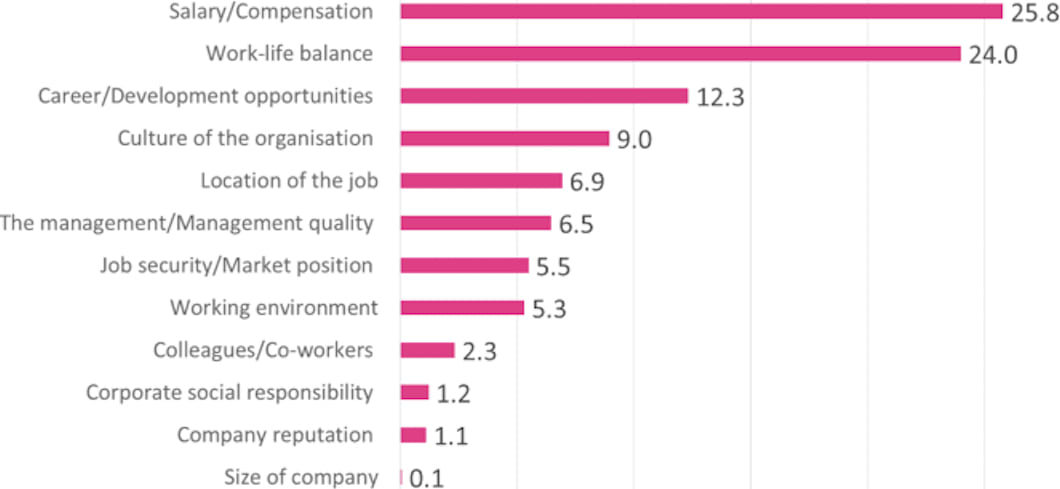
Employers are urged to act swiftly and decisively to secure good recruits as staffing woes continue
Companies are upping the ante to keep hold of precious staff, from offering hourly bonuses to same-day hiring, as a new report shows salary and flexible working arrangements remain the top priorities for job-seekers.
Job listing website Seek surveyed about 4850 people between September and December last year for its Laws of Attraction report examining what it takes to win over candidates.
According to the report, attracting talent is one of the greatest challenges New Zealand businesses currently face.
The largest proportion of respondents rated salary and compensation as the biggest draw factor (25.8 percent), followed by work-life balance (24 percent), career development opportunities (12.3 percent) and organisational culture (9 percent).
Working from home topped the list as the most searched keyword in the June quarter, while 39 percent of job-seekers would resign if working from home was not an option.
12 drivers of job attraction

Aside from boosting salaries to keep in line with inflation, Frog Recruitment managing director Shannon Barlow says some companies are offering sign-on bonuses to staff who refer successful candidates.
Other firms are taking a direct approach to retaining workers, while encouraging their staff to be more conscientious when it comes to turning up to work. For example, Barlow says one logistics company is offering an extra dollar an hour worked if the employee turns up to all of their rostered shifts.
“A bird in the hand is worth two in the bush...These companies are jumping on the opportunity to hire candidates instead of allowing another employer to be an option for that candidate," – Shannon Barlow, Frog Recruitment
“If they work their full weekly hours, such as a 38 hour working week, they’ll get an extra $38. For workers in some industries, that’s a significant bump.”
The financial sugar hit isn’t intended to pull sick staff members or those off work for a legitimate reason into work, but rather to incentivise those who might be inclined to skip their shifts.
Other companies are moving quickly to secure workers, particularly in industries seriously struggling with staff shortages.
Hotel business Accor is doing same-day hires for hospitality workers, where they are interviewed, handed a contract, and start working on the same day.

“A bird in the hand is worth two in the bush, as they say,” Barlow says.
“These companies are jumping on the opportunity to hire candidates instead of allowing another employer to be an option for that candidate.”
Usually a business would follow the ‘hire slow, fire fast’ adage, but Barlow says some desperate businesses are throwing that equation out the window.
“Employers need to say near enough is good enough, particularly in hospitality where you just need people to turn up and do the job.”
If there’s one thing bosses should avoid doing, it's resting on their laurels, according to Rob Clark, Seek’s New Zealand country manager.

Clark says employers need to be acting quickly to contact people interested in their vacant roles as soon as the applications come in, instead of waiting a couple of weeks until the application deadline rolls over.
“You've got to get onto those candidates quickly and start engaging them as early as you can,” he says.
“Bosses have to realise that candidates probably have a lot of options. If you wait too long, you will probably lose them.”
Candidates cautious amid complex market
Michelle Visser, co-founder of recruitment agency Fusion Partners, says the employment market is the most complex that she’s ever seen in her 25-year-long career.
Aside from the low unemployment rate and lack of people arriving in the country due to Covid, she says people are beginning to focus on how much a job pays and becoming increasingly cautious about switching jobs as storm clouds linger over the economy.
"We used to get maybe 50 applicants for a role - now we get maybe a handful,” – Michelle Visser, Fusion Partners
“It was totally opposite during Covid. People were beginning to think about what mattered to them and whether they were working with an organisation they were aligned with," she says,
“People are becoming more cautious again … There’s fewer people in the market actively looking for roles, we’ve got the lowest unemployment we’ve seen in a long time, there’s that underlying economic uncertainty [with a possible recession incoming]. We used to get maybe 50 applicants for a role - now we get maybe a handful.”

“All of these things combined are really hindering employers, so we’re seeing them under lots of pressure to find good people.”
Visser says employers should be building a strong online presence and brand so that prospective employees have a clear image of who they are and what they offer above their competitors, particularly through social media channels such as LinkedIn.







